 |
Family History
Wines Photography Books |
|
|
TheRagens Wine Tastings
|
Lithuania Memories - Summer 2003In the summer of 2003, our extended family visited Lithuania for a week to rediscover part of their ancestral heritage. The visit was educational and eye-opening; as part of the experience, several people put pen to paper to describe what this meant to them. Some of these memories are reflective, some are short, some are even poetic! Contributors (so far) include:
I have tried to coordinate the comments with a variety of pictures from this trip, as best possible. I think well over a thousand pictures were taken so the few shown on this page are hopefully the ones that illustrate the text most effectively. There are more great pictures on a second page that I just couldn't fit into this page.
MimiLithuania was “back then”. None of our elders seemed nostalgic. And none seemed to want to know much about “back then”. Now we are trying to connect the dots of what was. Who was there? How did they live? What did they do? And thanks to technology and Jeddy and Regina we have learned a lot and can learn much more. But the generations between Lithuania and ourselves seemed all clammed up. In fact, one of my three sets of Lithuanian great grandparents stayed behind. And there is now evidence of trips back to see them by some great aunts and our Uncle Sam. And there were photos in drawers of what we now know are close family. But all unlabeled and unsung. It was as though, in leaving Lithuania, the fabric had been irretrievably torn, leaving jagged edges - siblings scattered - some to the U.S., some to South Africa, and some to Israel. They dealt with it by not dwelling on the pain or loss, certainly not with us grandchildren. And so, from both grandmothers, I heard about the leave-takings and the arrivals and the list of siblings and where they lived now -- but not about the world they left behind.
So where was the romance of Lithuania for me? I don’t know. It just seemed important to connect those we knew and loved with what we could learn about their history, to see the spaces where they lived, the world they knew. What did they leave to become our grandparents? Why in the world were they so proud of being LITVAKS? Since our trip we know a little more. We know the country is beautiful and clean, and full of people who look a lot like us. We know more firsthand of the glorious Jewish Culture that developed there and why Vilna was such an important center of learning. We understand better how Lithuania was buffeted between powerful nations, their ties with Poland, the enmity with Russia. And we know exactly what happened to the Jews when the Nazis invaded in 1941. And it leaves me wondering profoundly what we can learn from this story beyond a closer sense of the virulence of Anti-Semitism and how it operates to ventilate popular frustration. Is there anything we can glean that sheds light on the Anti-Western mood in the middle east, or on the Israel/Palestine conflict? I have been thinking about the parallels in patterns of violence a great deal since our trip. I also was able to meditate on all of this in Israel only a few weeks after we returned. All of this has left me feeling more realistic about human nature and less optimistic about the future. The need to feel powerful today seems to trump humanity most of the time. But trips like ours solidify a lot of good strong family ties. It is better to worry about all of this together. Onward!
Angie LieberPerhaps it was Azerbaijan that I had in my head when I began thinking about the extended family trip to Lithuania. Streets flanked by open sewers, Gypsy children smoking cigarettes, Soviet style lines that one needed to bribe one's way to the head of, thieves lurking behind street corners with schemes that could fool even a bred New Yorker, and then outside of the city - fields of nothingness. I guess it’s fair to say that I was wrong. It's true that we did have a Saturday afternoon lunch in what appeared to be the middle of the Gowanus Housing Projects, and that I wanted to do a special Lithuanian promotional campaign for Arid or Right Guard, but on the whole it was far from the undeveloped fantasy I had in my mind.
I did not experience the weird displacement that I feel when traveling to a third world country. I was okay, but something else was displaced. Day after day we visited the nonexistent Jewish culture of Lithuania.
Instead of confronting the sadness of the fantasized third world country, I discovered a different kind of sadness, one that I had not yet experienced in any of my world travels: my own.
My imagination flowed when my feet touched the ground where the murdered stood. Sturdy, crippled, fertile, sterile, ingenious, foolish, hideous, beautiful, brave, cowardly, chaste, prurient, tall, short, dark, fair, virtuous, unprincipled, young and old. They stood, complex in their make up, as complex as Babel. Thousands stood as one, and in an abhorrent twist they were unified under the same God that they prayed, an entire group with one faceless face – at the edge of a twenty foot pit, shot in its collective head. And instead of dealing alone with sadness as I would in a third world country where I usually travel by myself, here I was blessed with the buffer of the hearts of 20 of my family members.
We had our bus load of analyzing,
processing, therapizing; smoked fish, Tylenol, diet Coke; discussions, votes,
arguments, agreements; hand holding, tear wiping and hair messaging to keep
things in perspective. We puckered our lips at the putrid taste of Gira, the
beverage made from fermented bread. We drank the borscht here, and the borscht A third world country Lithuania is not. It is not the disastrous painfully pre-modern Lithuania of Jonathan Franzen's "Corrections". It is on the brink of becoming a member of the European Union. It is a country with a difficult history, traumatized by centuries of foster care. But with independence and strength it will soon come to terms with its wayward past. I am very glad that I made the trip. Everyone we met taught me something. Every place we went moved me. Everything I tasted fascinated me. Extra Bonus: flushing toilets.
Josh
The article includes a vivid description of
Trakaii, the Curonian Spit and the Stiklaii Hotel. About this, Keller writes:
"We stayed in the Stikliai, a luxury hotel cleverly insinuated into a
17th-century building in the Jewish quarter. The furnishings and food were
exquisite, although the architects seem to have been some-times baffled by the
challenge of reconciling the 17th and 21st centuries. We stayed in a sloped
attic room the size of an Olympic swimming pool, with the furniture clustered at
one end and the closet at the other end."
SariLithuania was, for me, a very real mix of emotions, experience and disconnects. My experience on the plane perhaps exemplifies this the best. As I waited in line for my connecting flight in Copenhagen, a tall, attractive, American businessman stepped up behind me. I, oddly, felt immediately comforted. No one else in line looked remotely like me, or like they might speak my language. I waited in line anticipating a moment when I might begin a trivial conversation with him and forget my anxieties about flying to a city capital I had not known existed before my trip. I thought he might relieve for me, the estrangement that I felt at the thought of returning to an unrecognizable homeland. He was recognizable to me. As I reached the front of the line, he asked, "Why Poland?" And I knew this was not his journey. The woman behind the counter, clearly noting my concern at being left said with a smile, "You can wait until the next plane shuttle bus if you'd like to keep talking to your friend." But how do you ask a stranger to stay and talk to you in the Copenhagen airport? In many ways, this initial moment reflects many of my feelings about the trip as a whole. I wanted to feel connected the land and to the family I knew on the trip, but I felt a repeated disconnect. I strove to make personal meaning of the places and events, but the constant chatter and enumeration of body counts made me feel more isolated than ever. I wanted just to be in the place; I wanted to imagine those currents in my blood that are my ancestors reconnecting with a soil that was once their own. But, instead, I felt the constant sharp breaks in that serene and seemingly natural processes. Those breaks came with the pronunciation of the word "HO-LO-CAUST." That moment in history seems to me to be the hollow cost of our trip: Hollow, because we cannot retrieve it; cost, because it taxes us emotionally and mentally, both rightly so and also in a way that detracts from our ability to just be there. The incessant repetition of an unforgettable, unforgivable, and irretrievable history thrusts us further from a past we might make a part of our present: the lives of our real, not imagined, ancestors. With every "how could they do that to us?" we pulled farther and farther away from potentially palpable past. It became 'US' against them. (How fitting these pronoun's letters seem in light of our current identifications and history).
I do not deny that I received life from the trip as well. I no longer needed the American businessman in the airport. I began to love my cousins more dearly and with a greater passion and understanding than I did before. I feel that pulsing life. At a certain point, the trip needed to be about those bonds. I wanted to know about my cousin Betsy's four children who I have never met. I wanted to talk with my cousin Angie about her experiences with her mother. I wanted to go dancing at a Lithuanian bar with my cousins Michael and Stephen. And that's what the trip became for me: an opportunity to connect with the living because I was repeatedly pushed from the still reverberating voices of the dead. I know that beneath the others' screams, they still whisper.
|
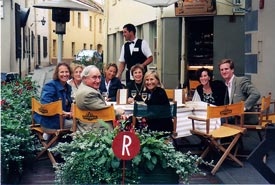 |
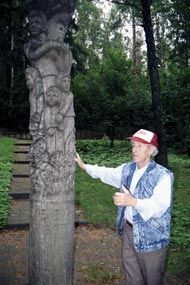 |
The second world for me was the world of the
people we encountered: Emmanuel, Regina, Rachel and all the wonderful people we
met at that
very first dinner were lights into the future of Lithuanian Jewry
and the hope that the community can become revitalized with their enthusiasm and
effectiveness and our continued support. Of course, there was also Mr. Bunka,
the last living Jew in Plungyan (our shtetl), his wonderful sculptures at home
and powerful memorials in the forest nearby in which so many Jews were killed.
We also had our mini conversations with regular Lithuanians during some of our
walks and the vision of modern Lithuanian past times at the Baltic Sea. And,
let’s not forget the excitement of the last night: we had met the current
president of the country and had gone on a wonderful tour of the presidential
palace, but then, at dinner, before
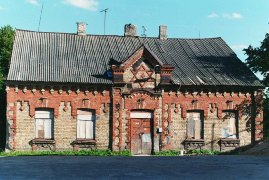 our nostalgic sharing of the trip’s wonders,
we had the opportunity to meet the first and second presidents (and the future
ambassador) as well! What a night.
our nostalgic sharing of the trip’s wonders,
we had the opportunity to meet the first and second presidents (and the future
ambassador) as well! What a night.
The third world was that of the past, both the sadness I experienced seeing boarded up synagogues and beautiful small towns which had once housed thriving Jewish communities, now void of Jews, and the overwhelming sense of grief, lost potential, anger and horror I felt at the killing sites throughout the country – the beautiful forests which have such an awful story to tell. There were moments I didn’t think I’d even get off the bus again, but my sense of honoring those who did not have that choice was stronger than my urge to protect myself from having to absorb yet another grim story.
This trip was truly a trip I will never forget. And I will always treasure that experience.
![]()
The Levin Family journey through Lithuania was both painful and joyful, but for me, without question, the joyful parts prevailed.
The pain of confronting the horrors of the Jewish Holocaust in Lithuania was tempered, to some extent, by having visited the concentration camps of Poland several years earlier. Visiting the sites of the Lithuanian “killing fields”, and learning of the complicity of the local population, however, brought new horrors to light, and the murdered children in particular were foremost in my mind during Yom Kippur services this year. The courage, determination and spirit of the current community of Lithuanian Jews was a source of inspiration and hope. Yet the growing anti-Semitism around the world makes me realize that the unthinkable could happen again.
 But there were also wonderfully positive
experiences during the trip. Some of these were visiting places where my father,
Ben Halpern, worked and vacationed during his days as a young single man. While
my father was born and raised in current day Poland, he spent a number of years
in Lithuania in the 1920’s. It was a time of great hardship in many parts of
Eastern Europe, but Lithuania was relatively free of the turmoil that engulfed
other countries at that time, and it was also, at that time, a place where Jews
could do well. Indeed, my father worked as a bookkeeper for a Jewish mill owner
who was, according to my dad, “the Henry Ford of Kalveria”. While my dad left
Lithuania for greater opportunity in America, he was always proud of his
professional success in Lithuania, and looked upon it as a relatively happy part
of his life. Visiting the mill where he worked and the seaside resort areas
where I have pictures of him and his friends happily vacationing, brought to
life many of the stories I had heard for years. Learning that the mill owner and
his family, with whom my dad was quite close, had left for Israel before the
Holocaust, was a great source of comfort. I don’t know if my dad knew this or
not.
But there were also wonderfully positive
experiences during the trip. Some of these were visiting places where my father,
Ben Halpern, worked and vacationed during his days as a young single man. While
my father was born and raised in current day Poland, he spent a number of years
in Lithuania in the 1920’s. It was a time of great hardship in many parts of
Eastern Europe, but Lithuania was relatively free of the turmoil that engulfed
other countries at that time, and it was also, at that time, a place where Jews
could do well. Indeed, my father worked as a bookkeeper for a Jewish mill owner
who was, according to my dad, “the Henry Ford of Kalveria”. While my dad left
Lithuania for greater opportunity in America, he was always proud of his
professional success in Lithuania, and looked upon it as a relatively happy part
of his life. Visiting the mill where he worked and the seaside resort areas
where I have pictures of him and his friends happily vacationing, brought to
life many of the stories I had heard for years. Learning that the mill owner and
his family, with whom my dad was quite close, had left for Israel before the
Holocaust, was a great source of comfort. I don’t know if my dad knew this or
not.
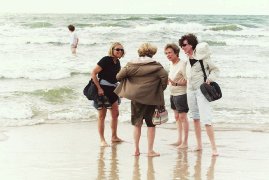 But it was the warmth and camaraderie of the
Levin family, and our wonderful guide, Regina, whom we all felt was part of the
family before the trip was over, that really made the trip outstanding. It was
remarkable that 21 of us could spend a week together, much of it in a crowded
little bus, and all come out appreciating one another even more than we had
before the trip. Whether it was eating Betsy’s smoked eel in the back of the
bus, debating with Josh whether or not to go to the Russian border, or figuring
out how to get a meal in less than three hours, we had great fun and got through
it all with love and affection for each other. It was a tribute to the roots and
genes of a wonderful family, and a victory over the forces of destruction
against our people.
But it was the warmth and camaraderie of the
Levin family, and our wonderful guide, Regina, whom we all felt was part of the
family before the trip was over, that really made the trip outstanding. It was
remarkable that 21 of us could spend a week together, much of it in a crowded
little bus, and all come out appreciating one another even more than we had
before the trip. Whether it was eating Betsy’s smoked eel in the back of the
bus, debating with Josh whether or not to go to the Russian border, or figuring
out how to get a meal in less than three hours, we had great fun and got through
it all with love and affection for each other. It was a tribute to the roots and
genes of a wonderful family, and a victory over the forces of destruction
against our people.
![]()
“We are Here”
The setting sun
a flood of pain
flows wordless from the
grey horizon
like old souls unsettled
aching to be heard again
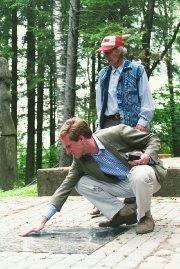 Listen for the voices that are gone
Listen for the voices that are gone
help me hear beyond the horror
and embrace the life and laughter --
the hardest thing I have ever done
In the great green forest
the silent fir trees stand –
it is not their fault –
imperturbable
they spread their arms to a vacant sky
Do they not see the terror?
Families assembled at gunpoint
scientific separation
six years and older lined along the edge and shot
the littler ones lacerated with nail-studded paddles
pushed into the pits and left to bleed to death
Do they not hear the cries
dissipating like smoke
above the verdant branches
knit so thick
you cannot see between them
rocking, aching in the wind
trunks erect
the sentinels stand in silent solidarity
guarding unspeakable secrets
and muted memories
unwitting monuments to a massacre
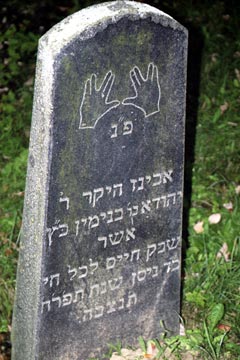 Yitgadal v’yitkadash sh’mei rabah
Yitgadal v’yitkadash sh’mei rabah
the words come now in ancient Aramaic
echoing the sages and the ages
fragments of Paneriai’s past
incomprehensible…
Adela of the streets
risks a furtive smile
still blue eyes reaching fifty years
across the chasm
“My family,” she says,
“hid two little girls.
They were so beautiful
with round faces.
They never came back…
We love you very much…”
The hint of eucalyptus in the air
extends a tantalizing invitation
beckoning enigmatically
drawing us in toxic trance
up the earthen path
our steps rise and fall
in slow relentless rhythm
of a force beyond our will
into the forest
cradling children who know no better
centuries of
mending socks
learning sacred Talmud
cooking chickens
lighting Shabbos candles
hitching horses
gathering tzedakah
tying shoes
making love
and praying to Hakodosh boruch hu
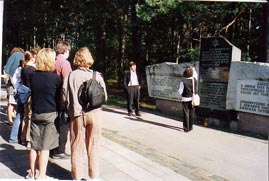 pass before the unforgiving firs
pass before the unforgiving firs
markers of the horror
turning uncomprehending eyes
to empty skies
our pounding chests outpace our wooden feet
to the unspeakable altar among the evergreens
there is no angel now to hold their hand
no ram in the thicket
the clattering panic of hearts
bursting, breaking
with skulls of infants
smashed against the trunks
shots shattering
life as we know it
pulverizing prayers
Plungyan
three hundred years of shtetl life
now smoke and silence
eighteen hundred bodies and souls --
the only families we have --
who left us with the anguish
and the questions
and the love
Oseh shalom b’mromav
Hu ya’aseh shalom
Aleinu
V’al kol Yisrael
V’al kol yoshvei teivel
V’imru amen
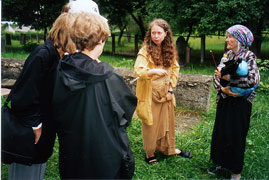 In Telz amid the tombstones
In Telz amid the tombstones
a wizened woman
in tattered scarves of violets and roses
and soggy tennis shoes
carrying a stick and water bottle
reminisces –
well kept cemeteries
servants
kindnesses
of Jews
rounded up and taken
by Lithuanians and Germans
luminous blue eyes
stare uncomprehending
over the ramshackle stones…
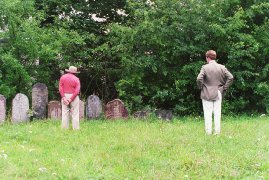 Still now
Still now
listen for the voices
Do you hear them?
in the mournful calls of ghost-white gulls
careening over Klaipeda
ancient incantations
of Kovno’s wistful wind,
whispering pines
the creaking of a rusty cart
behind the clip-clop laboring horse
resolutely challenging the hill,
the crisp chip-chop of
the surviving sculptor’s chisel
reclaiming faces,
gestures of horror and heroines
from the contorted trunks of abiding oaks
the piercing singing stars
defying darkness
And faint
but stronger now
they come
the footsteps and the hymn of partisans
“Never say there is only death for you
The leaden skies concealing days of blue
Because the hour we have hungered for is near –
Beneath our tread the earth shall tremble –
We are here”
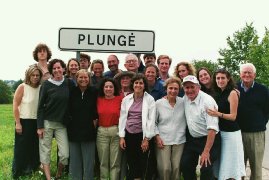
|
| ||||||||||||||||||||||||||||||||||||||||||||